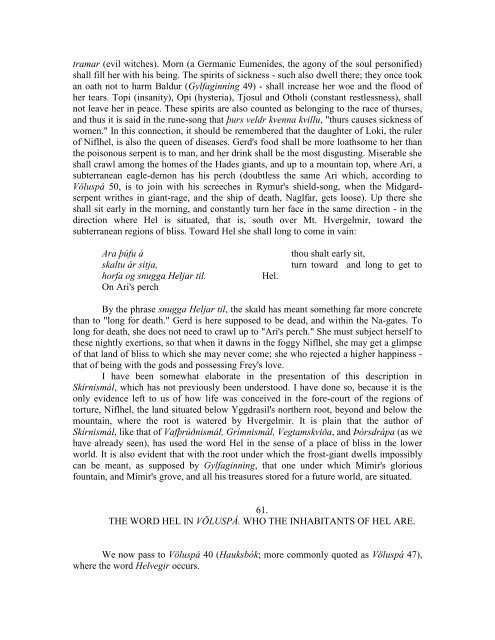Chapters 44-95 - Germanic Mythology
Chapters 44-95 - Germanic Mythology
Chapters 44-95 - Germanic Mythology
You also want an ePaper? Increase the reach of your titles
YUMPU automatically turns print PDFs into web optimized ePapers that Google loves.
tramar (evil witches). Morn (a <strong>Germanic</strong> Eumenides, the agony of the soul personified)<br />
shall fill her with his being. The spirits of sickness - such also dwell there; they once took<br />
an oath not to harm Baldur (Gylfaginning 49) - shall increase her woe and the flood of<br />
her tears. Topi (insanity), Opi (hysteria), Tjosul and Otholi (constant restlessness), shall<br />
not leave her in peace. These spirits are also counted as belonging to the race of thurses,<br />
and thus it is said in the rune-song that þurs veldr kvenna kvillu, "thurs causes sickness of<br />
women." In this connection, it should be remembered that the daughter of Loki, the ruler<br />
of Niflhel, is also the queen of diseases. Gerd's food shall be more loathsome to her than<br />
the poisonous serpent is to man, and her drink shall be the most disgusting. Miserable she<br />
shall crawl among the homes of the Hades giants, and up to a mountain top, where Ari, a<br />
subterranean eagle-demon has his perch (doubtless the same Ari which, according to<br />
Völuspá 50, is to join with his screeches in Rymur's shield-song, when the Midgardserpent<br />
writhes in giant-rage, and the ship of death, Naglfar, gets loose). Up there she<br />
shall sit early in the morning, and constantly turn her face in the same direction - in the<br />
direction where Hel is situated, that is, south over Mt. Hvergelmir, toward the<br />
subterranean regions of bliss. Toward Hel she shall long to come in vain:<br />
Ara þúfu á<br />
skaltu ár sitja,<br />
horfa og snugga Heljar til.<br />
On Ari's perch<br />
Hel.<br />
thou shalt early sit,<br />
turn toward and long to get to<br />
By the phrase snugga Heljar til, the skald has meant something far more concrete<br />
than to "long for death." Gerd is here supposed to be dead, and within the Na-gates. To<br />
long for death, she does not need to crawl up to "Ari's perch." She must subject herself to<br />
these nightly exertions, so that when it dawns in the foggy Niflhel, she may get a glimpse<br />
of that land of bliss to which she may never come; she who rejected a higher happiness -<br />
that of being with the gods and possessing Frey's love.<br />
I have been somewhat elaborate in the presentation of this description in<br />
Skírnismál, which has not previously been understood. I have done so, because it is the<br />
only evidence left to us of how life was conceived in the fore-court of the regions of<br />
torture, Niflhel, the land situated below Yggdrasil's northern root, beyond and below the<br />
mountain, where the root is watered by Hvergelmir. It is plain that the author of<br />
Skírnismál, like that of Vafþrúðnismál, Grímnismál, Vegtamskviða, and Þórsdrápa (as we<br />
have already seen), has used the word Hel in the sense of a place of bliss in the lower<br />
world. It is also evident that with the root under which the frost-giant dwells impossibly<br />
can be meant, as supposed by Gylfaginning, that one under which Mimir's glorious<br />
fountain, and Mimir's grove, and all his treasures stored for a future world, are situated.<br />
61.<br />
THE WORD HEL IN VÖLUSPÁ. WHO THE INHABITANTS OF HEL ARE.<br />
We now pass to Völuspá 40 (Hauksbók; more commonly quoted as Völuspá 47),<br />
where the word Helvegir occurs.
















